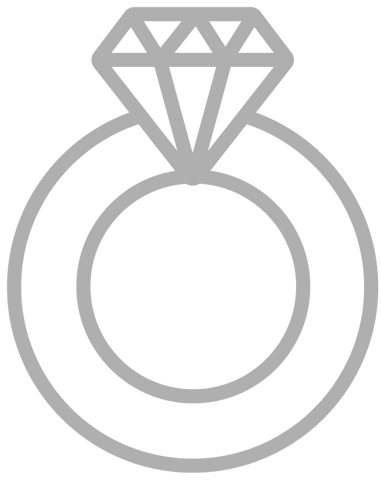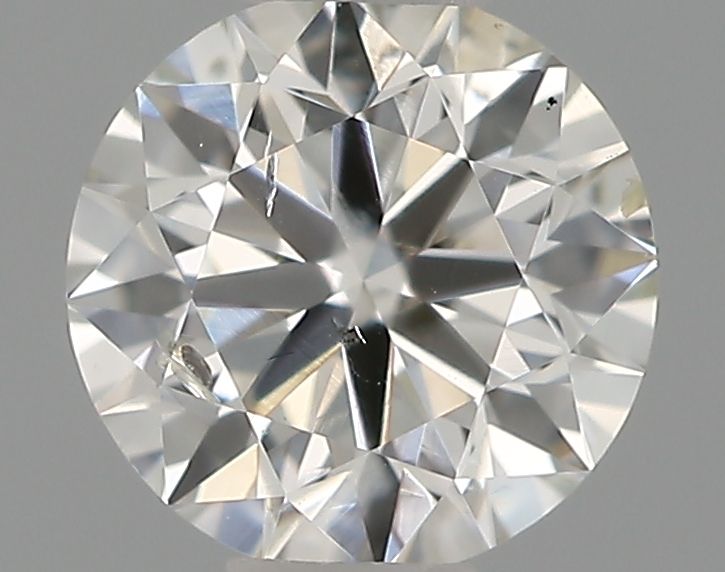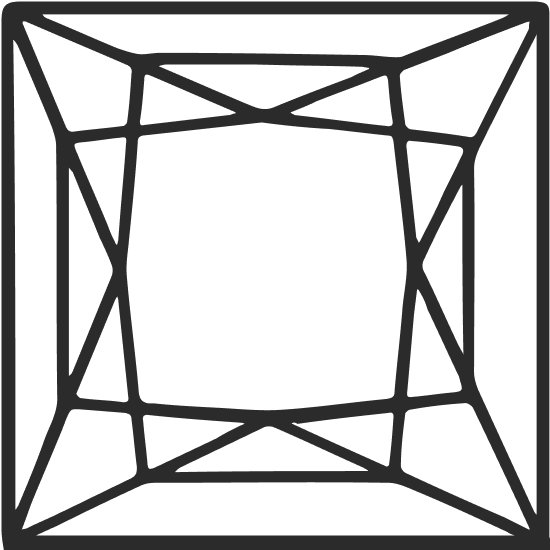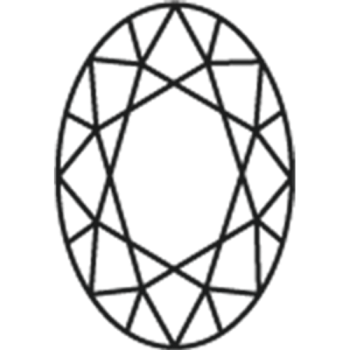Select Metal
Select Shape
Select Style
 Natural Diamonds
Natural Diamonds
 Lab Grown Diamonds
Lab Grown Diamonds

Get Fergus top tips when it comes to selecting the right diamond for you!
LAB GROWN
- Lab Grown diamonds are grown in a Lab within 1-2 months.
- Lab Grown diamonds are made up of only carbon atoms. Therefore, the chemical formula of the diamond is C.
- Lab Grown diamonds are visually identical to natural diamonds in terms of appearance. They possess the same brilliance, fire, and optical characteristics of their natural counterpart. You cannot tell the difference with the naked eye.
- Have become popular due to being totally conflict-free and environmentally friendly production. They have a significantly lower carbon footprint compared to mined diamonds and do not contribute to harmful mining practices.
- Provide excellent value for their cost, making them an attractive option for buyers. They are typically ~70% cheaper than a natural diamond of the same size and specification.
NATURAL
- You don’t need to get the highest quality diamond to get something that is of equal beauty. The price will vary depending on the quality of diamonds in the market, the source of the diamond and where if was manufactured.
- Naturally formed in the lower mantle of the earth’s core before being pushed to the earth’s surface through deep volcanic eruptions – the process takes millions of years.
- Natural diamonds are made up of only carbon atoms. Therefore, the chemical formula of the diamond is C.
- Natural diamonds possess stunning sparkle, brilliance, fire, and optical characteristics.
- Some individuals value natural diamonds more due to their rarity and tradition.
- Higher price due to the extraction time and effort being much longer when compared to the process to produce a lab grown diamond.
Carat is a diamond’s weight, not its size – how large a diamond appears is also dictated by other factors such as shape and cut proportions – the following guide shows the approximate correlation between carat weight and size for all the diamond shapes.
Fergus James Top Tips
- Buying a 0.9ct diamond, as opposed to a 1ct diamond only reduces size measurements by around 5% but reduces the price by around 25%
- With round diamonds pay extra attention to the cut – Fergus James recommends excellent cut for round diamonds - with fancy shapes (all the other shapes) pay attention to the actual measurements (in mm) outlined on the diamonds GIA certificate.
- Diamond prices increase disproportionately when you reach the half and full carat mark (eg 0.50ct – 1.00ct – 1.50ct – 2.00ct, etc). The value lies just below these measurements.

See on
hand

Get Fergus top tips when it comes to selecting the right diamond for you!
SHAPE
Diamonds come in 10 different shapes all of which are unique and offer a different type of scintillation and sparkle.
BUDGET
You don’t need to get the highest quality diamond to get something that is of equal beauty. The price will vary depending on the quality of diamonds in the market, the source of the diamond and where if was manufactured.
CARAT
Carat is a diamond’s weight, not its size – how large a diamond appears is also dictated by other factors such as shape and cut proportions – the following guide shows the approximate correlation between carat weight and size for all the diamond shapes.
Fergus James Top Tips
- Buying a 0.9ct diamond, as opposed to a 1ct diamond only reduces size measurements by around 5% but reduces the price by around 25%
- With round diamonds pay extra attention to the cut – Fergus James recommends excellent cut for round diamonds - with fancy shapes (all the other shapes) pay attention to the actual measurements (in mm) outlined on the diamonds GIA certificate.
- Diamond prices increase disproportionately when you reach the half and full carat mark (eg 0.50ct – 1.00ct – 1.50ct – 2.00ct, etc). The value lies just below these measurements.
COLOUR
The colour scale measures very subtle variances in the shade of a diamond. D has zero colour shade (perfectly white) whilst Z has a yellow/brownish tinge. The way a colour appears visually in a diamond depends upon the diamond shape as well has the cut and the ring setting

Fergus James Top Tips
- Round Diamonds are the best at hiding colour
- Big Brands - Cartier generally use D-F - whilst Tiffany generally use D-I colour
- Fancy Shape - fancy shapes show colour more than round diamonds
- Diamond size - the larger the diamond the more the colour shade shows
- Halo Ring Designs - select D-G colour for halo ring designs as the colour shows more in this design
- Visual appearance - D-F colors look identical to the naked eye but the price typically varies considerably
If you are unsure contact the Fergus James team for practical guidance - CONTACT
CLARITY
Clarity is the measurement of natural inclusions found within the diamond. Every diamond, with the exception of Flawless and Internally Flawless diamonds, have inclusions to a great or lesser degree. Some inclusions are visible to the naked eye but most are not. The shape, size and position of the inclusions, as well as the shape and size of the diamond, all contribute. If the inclusions in a diamond cannot be seen with the naked eye they are referred to as being “eye clean”. From a practical point of view, there is no visual day-to-day difference between an eye clean SI1 and a flawless diamond.

Fergus James Top Tips
For Brilliant-Cut diamonds, especially Round shape, you can typically find eye clean diamonds in the “SI” range and easily within the VS bracket - our curation team are experts at finding a clean stone so contact us for advice and options.
For Step-Cut diamonds (Emerald and Asscher shapes) you’re best to stick to VS1 or the VVS range to ensure they are 100% eye clean.
If you find something you are unsure about we are simply a message away! Remember our curation team inspects every single diamond, so beauty is guaranteed!
CUT
The cut only applies to round diamonds and has the biggest impact on the overall beauty, sparkle and appearance of the diamond. The cut is the most important aspect of the selection process. The better the cut the more the diamond sparkles. The GIA only measures ‘cut’ for round diamonds, not fancy shapes (all other shapes such as oval, pear cushion etc).
Fergus James Top Tips
- Round Shape - for maximum sparkle select an excellent cut
- Appearance - excellent cut diamonds appear larger than vg cut diamonds
- Fancy Shape - Focus on diameter and proportions to maximize appearance
- Contact - for fancy shapes we recommend you contact our team for help and advice

FLUORESCENCE
Fluorescence refers to the glow of a diamond when seen under intense UV Light.
Fergus James Top Tips
Fergus James subscribes to GIA’s view on Fluorescence; where it is regarded as neither a good or bad aspect but is purely down to personal preference. If you are looking for value, strong or medium will work for you. If it feels wrong for you, then aim for faint or none.
The main myth surrounding Fluorescence is that diamonds with higher Fluorescence are milky which is incorrect - milkiness can be found in diamonds with and without fluorescence!
Day to Day, Fluorescence is not visible.
SYMMETRY
Symmetry refers to the precision of how a diamonds facets align as well as how it interacts with light.
Fergus James Top Tips
Based on years of practical experience, Fergus’ top tip is to stick within the Excellent to Very Good range for symmetry, there is no visual difference between Excellent and Very Good. So don’t let an otherwise perfect stone go if the symmetry is Very Good. If seeking perfection, we would always recommend to look for a diamond with ‘Excellent’ symmetry in order to optimise the diamonds fire and brilliance.
POLISH
Polish refers to the final finish of a diamond used to smoothen out a diamonds facets to achieve a glass like surface. GIA examines all diamonds under 10x magnification to grade the diamonds final polish features ranging from excellent to poor.
Fergus James Top Tips
Based on years of practical experience, Fergus’ top tip is to stick within the Excellent to Very Good range for polish, there is no visual difference between Excellent and Very Good. So don’t let an otherwise perfect stone go if the polish is Very Good.
CERTIFICATE
Diamond certificates are issued to confirm a stone’s technical characteristics, value and identity. The GIA (The Gemological Institute of America) have set the worldwide standards in diamond grading since 1931 and have continued to lead the grading standards since. For example, when GIA grades a diamond as a D then the diamond is a D. When other institutes grade a diamond as a D colour, the GIA may not consider the diamond as a D as it may not be measured to the same standards as the GIA.
Fergus James Top Tips
All diamonds at Fergus James are GIA certified diamonds, this is so we can ensure we’re giving our customers the very best according to international standards set by GIA.
RING DETAILS
DIAMOND DETAILS
PERSONALISE
Subtotal

Get Fergus top tips when it comes to selecting the right diamond for you!
SHAPE
Diamonds come in 10 different shapes all of which are unique and offer a different type of scintillation and sparkle.

Get Fergus top tips when it comes to selecting the right diamond for you!
BUDGET
You don’t need to get the highest quality diamond to get something that is of equal beauty. The price will vary depending on the quality of diamonds in the market, the source of the diamond and where if was manufactured.

Get Fergus top tips when it comes to selecting the right diamond for you!
COLOUR
The colour scale measures very subtle variances in the shade of a diamond. D has zero colour shade (perfectly white) whilst Z has a yellow/brownish tinge. The way a colour appears visually in a diamond depends upon the diamond shape as well has the cut and the ring setting

Fergus James Top Tips
- Round Diamonds are the best at hiding colour
- Big Brands - Cartier generally use D-F - whilst Tiffany generally use D-I colour
- Fancy Shape - fancy shapes show colour more than round diamonds
- Diamond size - the larger the diamond the more the colour shade shows
- Halo Ring Designs - select D-G colour for halo ring designs as the colour shows more in this design
- Visual appearance - D-F colors look identical to the naked eye but the price typically varies considerably
If you are unsure contact the Fergus James team for practical guidance - CONTACT

Get Fergus top tips when it comes to selecting the right diamond for you!
CLARITY
Clarity is the measurement of natural inclusions found within the diamond. Every diamond, with the exception of Flawless and Internally Flawless diamonds, have inclusions to a great or lesser degree. Some inclusions are visible to the naked eye but most are not. The shape, size and position of the inclusions, as well as the shape and size of the diamond, all contribute. If the inclusions in a diamond cannot be seen with the naked eye they are referred to as being “eye clean”. From a practical point of view, there is no visual day-to-day difference between an eye clean SI1 and a flawless diamond.

Fergus James Top Tips
For Brilliant-Cut diamonds, especially Round shape, you can typically find eye clean diamonds in the “SI” range and easily within the VS bracket - our curation team are experts at finding a clean stone so contact us for advice and options.
For Step-Cut diamonds (Emerald and Asscher shapes) you’re best to stick to VS1 or the VVS range to ensure they are 100% eye clean.
If you find something you are unsure about we are simply a message away! Remember our curation team inspects every single diamond, so beauty is guaranteed!

Get Fergus top tips when it comes to selecting the right diamond for you!
CUT
The cut only applies to round diamonds and has the biggest impact on the overall beauty, sparkle and appearance of the diamond. The cut is the most important aspect of the selection process. The better the cut the more the diamond sparkles. The GIA only measures ‘cut’ for round diamonds, not fancy shapes (all other shapes such as oval, pear cushion etc).
Fergus James Top Tips
- Round Shape - for maximum sparkle select an excellent cut
- Appearance - excellent cut diamonds appear larger than vg cut diamonds
- Fancy Shape - Focus on diameter and proportions to maximize appearance
- Contact - for fancy shapes we recommend you contact our team for help and advice


Get Fergus top tips when it comes to selecting the right diamond for you!
FLUORESCENCE
Fluorescence refers to the glow of a diamond when seen under intense UV Light.
Fergus James Top Tips
Fergus James subscribes to GIA’s view on Fluorescence; where it is regarded as neither a good or bad aspect but is purely down to personal preference. If you are looking for value, strong or medium will work for you. If it feels wrong for you, then aim for faint or none.
The main myth surrounding Fluorescence is that diamonds with higher Fluorescence are milky which is incorrect - milkiness can be found in diamonds with and without fluorescence!
Day to Day, Fluorescence is not visible.

Get Fergus top tips when it comes to selecting the right diamond for you!
SYMMETRY
Symmetry refers to the precision of how a diamonds facets align as well as how it interacts with light.
Fergus James Top Tips
Based on years of practical experience, Fergus’ top tip is to stick within the Excellent to Very Good range for symmetry, there is no visual difference between Excellent and Very Good. So don’t let an otherwise perfect stone go if the symmetry is Very Good. If seeking perfection, we would always recommend to look for a diamond with ‘Excellent’ symmetry in order to optimise the diamonds fire and brilliance.

Get Fergus top tips when it comes to selecting the right diamond for you!
POLISH
Polish refers to the final finish of a diamond used to smoothen out a diamonds facets to achieve a glass like surface. GIA examines all diamonds under 10x magnification to grade the diamonds final polish features ranging from excellent to poor.
Fergus James Top Tips
Based on years of practical experience, Fergus’ top tip is to stick within the Excellent to Very Good range for polish, there is no visual difference between Excellent and Very Good. So don’t let an otherwise perfect stone go if the polish is Very Good.

Get Fergus top tips when it comes to selecting the right diamond for you!
CERTIFICATE
Diamond certificates are issued to confirm a stone’s technical characteristics, value and identity. The GIA (The Gemological Institute of America) have set the worldwide standards in diamond grading since 1931 and have continued to lead the grading standards since. For example, when GIA grades a diamond as a D then the diamond is a D. When other institutes grade a diamond as a D colour, the GIA may not consider the diamond as a D as it may not be measured to the same standards as the GIA.
Fergus James Top Tips
All diamonds at Fergus James are GIA certified diamonds, this is so we can ensure we’re giving our customers the very best according to international standards set by GIA.

Get Fergus top tips when it comes to selecting the right diamond for you!
CARAT
Carat is a diamond’s weight, not its size – how large a diamond appears is also dictated by other factors such as shape and cut proportions – the following guide shows the approximate correlation between carat weight and size for all the diamond shapes.
Fergus James Top Tips
- Buying a 0.9ct diamond, as opposed to a 1ct diamond only reduces size measurements by around 5% but reduces the price by around 25%
- With round diamonds pay extra attention to the cut – Fergus James recommends excellent cut for round diamonds - with fancy shapes (all the other shapes) pay attention to the actual measurements (in mm) outlined on the diamonds GIA certificate.
- Diamond prices increase disproportionately when you reach the half and full carat mark (eg 0.50ct – 1.00ct – 1.50ct – 2.00ct, etc). The value lies just below these measurements.

Get Fergus top tips when it comes to selecting the right diamond for you!
Ring Size
If you know your partners ring size, you can select the size from the sizing options drop down provided. However, if you are unsure, simply select the “I don’t know” drop down option and a member of our team will help and guide you once your order is complete.
Quick tip: Fashion rings are generally looser fitting than engagement rings as they are made to be easily taken on or off, however with an engagement ring it should be slightly tighter to avoid it sliding off.
Remember, if you get the size wrong, we offer free resizing in Dubai, London, New York, Dublin and Brisbane with our trusted partners, so you can put your mind at ease.
- Alphabetically, A-Z
- Alphabetically, Z-A
- Price, low to high
- Price, high to low
- Price, low to high
- Price, high to low



























































